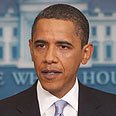
Time to visit Israel
Israel visit would signal Obama’s embrace of Jewish people’s past, future
Just weeks after President Obama’s Cairo speech urging upon the Muslim world “government of the people and by the people (that) sets a single standard for all who hold power,” Iran’s young people have rebelled against government of-and-for the mullahs. Inspired by his rhetoric but impatient at Obama’s caution, they want him to stop diplomatically courting Tehran’s autocracy in pursuit of unconditional negotiations over nukes and instead begin championing Iran’s people.
There is another people in the Mideast who also want President Obama to value their narrative. Not Palestinians who already have Obama’s unequivocal backing for a “two state solution,” but Israelis who, according to public opinion polls, are beginning to doubt the new American president’s comprehension of their Jewish state’s historic roots.
It’s past time for President Obama to pay Israel - left off his recent Mideast itinerary - an official visit, if not now, then next year in Jerusalem to identify with the reality about Israel left out of his Cairo speech.
On the one hand, Obama both in Cairo and later at Buchenwald powerfully stated the moral imperative of Israel as a haven for Hitler’s victims. On the other hand, he left out the Jewish people’s 3,000-plus year narrative with its historic homeland. As President Truman said, “the only thing new is the history you do not know.” In Obama’s case, there seems to be a disconnect with the deeply-rooted history of the Zionist Dream - from the Biblical David and Solomon to modern redeemers like Theodore Herzl and also Chaim Weizmann, who in 1948 helped convince Harry S. Truman that the Jewish People’s quest for Zion was a noble enterprise.
Freedom must be won
Allis and Ronald Radosh’s new book, A Safe Haven: Harry S. Truman and the Founding of Israel, underscores the critical importance of Truman’s meetings with Weizmann in convincing the American president to override the opposition of both State and Defense Departments to the United Nation’s 1947 “two-state solution” blessing the creation of a Jewish State. Putting aside his irritation at American Jewish lobbying, Truman for a critical moment empathetically saw the Middle East through the eyes of Weizmann. Israel’s first president convinced the American president that Jews had every right - historically and morally - to renew their destiny in the Holy Land.
In 1917, Weizmann had helped persuade the British to issue the Balfour Declaration, yet cautioned his fellow Zionists that a state had to be created, not be decrees, but by hard work. In reality, despite all the draconian edicts of occupiers from the Roman to Ottoman Empires, despite the bloody Crusades and British White Papers, there always was a Jewish presence in the Holy Land.
By 1939, there were already over 600,000 Jews living in the Holy Land chafing at the yoke of the British Mandate.
At their critical meeting on March 18, 1948, Zionism’s frail elder statesman won a reiterated pledge of US support for creation of a Jewish state by telling “The Man from Independence” that freedom always has to be won and defended - as it was in the American Revolution - it is never given to a people. The next day, the State Department orchestrated a speech at the UN by the US ambassador that pulled the props out from under the promise. Yet Truman did not waver - recognizing the independence of Israel on May 14.
A quick trip
On one side in 1948 was an American Jewish community that overwhelmingly shared Weizmann’s judgment that the only choice for the Jews of Europe and Palestine was “independence or extermination.” On the other side was the united American foreign policy establishment - Truman called them “the striped pants boys” - and the elite media led by New York Times publisher Arthur Sulzberger. It was a close call, but ultimately an American president decided that Israel had a right to be reborn.
Today, another president - Barack Obama - will likely be decisive in shaping the fate of the Middle East in the 21st century. He has made clear that he wants a fast-track to a Palestinian State. Yet when Israeli Prime Minister Netanyahu embraced that goal - with the sole caveat that Israel’s neighbors accept its “Jewish character” - every Arab leader from Mubarak to Abbas rejected it out of hand. For them, the Cairo speech validated their view that the creation of modern Israel isn’t the fulfillment of Jewish destiny but was a mistake foisted on the Arabs by a Western world feeling guilty over Auschwitz.
Now, President Obama - to create a true meeting of the minds behind “the two-state solution” - needs to apply his remarkable powers of persuasion to finally convince the Arab and Muslim world that Weizmann was telling truth when he told American presidents, from Wilson to Truman, that “We (the Jewish people) have never based the Zionist movement on Jewish suffering in Russia or in any other land.”
To do this, Obama should immerse himself in the dynamism of Israel and its tremendous social and economic success story. Since Israel is little more the size of New Jersey, a quick trip to the Western Wall, the Knesset, Hadassah Hospital, and an Intel factory in the Negev Desert should signal to the world the new American president’s embrace of the Jewish people’s past and future as integral to the Holy Land.
Rabbi Abraham Cooper is associate dean of the Simon Wiesenthal Center. Dr. Harold Brackma , a historian, is a consultant to the Simon Wiesenthal Center










